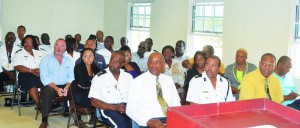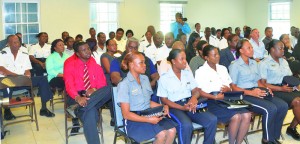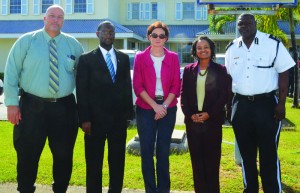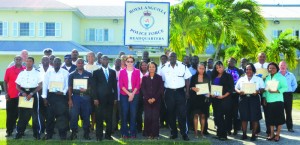



This year, there was a departure from previous years when there was only one lecture to the Royal Anguilla Police Force as part of its anniversary celebrations.
On Monday this week, January, 27, three addresses were delivered to which the Commissioner, Mr Rudolph Proctor, replied. The speakers were Her Excellency the Governor, Ms Christina Scott, who has responsibility for the Police since assuming office in July 2013; the Hon Jerome Roberts, Minister of Home Affairs; and Mrs Ronya Foy Connor, the recently-appointed Gender Affairs Development Coordinator.
“It is a real privilege to join you in celebrating Police Week as you mark your 42nd Anniversary,” Governor Scott told Commissioner Proctor and the other ranks of the Force. “Of course it is a chance to celebrate and acknowledge the unrecognised work that you are doing day in and day out to keep Anguilla safe. It is also a chance to build firmer relationships between yourselves and the community that you serve, and to reflect on some of the challenges that you face, as an organisation, as well as the future requirements that we will be placing on you.”
She said it was hard to think on a more challenging objective than when the police officers set themselves the challenge of creating a crime-free nation, which she described as an extraordinarily high bar. She thought however, that a zero tolerance approach to all sorts of crime was absolutely the right one – and the right level of ambition for a police force like that in Anguilla. She observed that there were no magic solutions to the tasks of crime-solving which required the participation of society on a whole.
She pointed out some of the ways in which the police can exercise a leadership role. “The first thing is that you have a crucial role to play in preventing people from becoming criminals, by using your powerful potential to influence and shape the lives of young people to prevent them from getting into a life of crime; and to interact with other agencies and families in Anguilla by using your community work, and knowledge of emerging problems, to stop young people from becoming involved in crime.”
Governor Scott continued: “The other thing you have amazing potential to do, is to help people not to become victims of crime by advising them on how to avoid harmful situations; how to protect their buildings and businesses; how CCTV can be used to make a business less likely to be attacked and to reduce their vulnerability to crime. I really urge you to have a sort of ambassadorial role. In that regard, when you are out and about in the community, point out when you see problems that people can fix and make them less likely to become victims of crime,” she advised.
She continued: “Of course what you really need, when you are chasing the bad guys, and trying to disrupt their activities, is the support from Government and the community. Essential to that is having the community work with you and to give you information. You know, as I do, how important it is to have a trusting relationship between yourselves and the community when it comes to sharing information. I would say that individuals have a moral responsibility to give you information to help you interrupt a planned crime or perhaps to catch somebody who has committed a crime.
“I know from conversations with the Commissioner that there are people out there walking around free, at the minute, who you would love to put behind bars, and who you have quite a lot of information on – and you are struggling to put behind bars [but]people feel nervous about giving you statements that would allow you to ensure prosecutions. All that of course boils down to the issue of trust, and people passing information to the police must feel that that information is protected, and where possible, identities are protected. That is not always possible when we are getting into prosecution, but it is crucial at the early stages.
“You are as aware as I am that there are perceptions in some quarters of the community that information given to the police isn’t protected. Now I think that perception is exaggerated …The problem though with these perceptions is that…it really only takes one or two isolated, ill-judged comments that undermine completely the rest of the wok that is done by the Police Force day in day out at a very high professional standard.”
The Governor told the police that first and foremost they had a responsibility to themselves to nurture and to build the trust that the community has in the police force. She added: “That high level of trust will only come about if you are deeply-rooted in the community that you serve.”
Meanwhile, Mr Jerome Roberts, the Minister of Home Affairs, congratulated the Commissioner and all ranks of the Force on their 42nd Anniversary under the theme “Fostering Community Participation, Creating a Crime-free Nation.” His address was based on the launch of a Police Pocketbook – which focuses on domestic violence. It originated from a recent workshop, for members of the Force, on domestic violence sponsored by the Governor’s Office.
“As we launch the Royal Anguilla Police Force Pocketbook today, one of the top priority areas for the Ministry of Home Affairs, with the newly-established Gender Affairs Unit, is working on passing comprehensive domestic violence legislation, “ he continued. “This legal document will better equip all law enforcement bodies in responding to one of the most sensitive and potentially dangerous situations – violence in our homes. The pocketbook, for the police officers, deals with cases of sexual and gender-based violence. It is a quick reference for the police to refresh the knowledge and skills developed during their training in gender-based violence.”
The Minister stated that gender-based violence and domestic violence continued to be a social problem, impacting every segment of the island’s population. “The commission of domestic violence is a crime and law enforcement must also treat it as such,” he added. “Police officers are often the first law enforcement personnel that victims of domestic violence encounter. The role of the Police is therefore key in terms of providing immediate protection and sensitivity to the victim, as well as other needed support.”
Mrs Ronya Foy-Connor, the recently-appointed Gender Affairs Development Coordinator, spoke about the soon-to-be-established Unit. “It is to be actively committed to fostering equal and humane treatment in the daily lives of every man, woman, girl and boy, thereby manifesting a united Anguilla,” she explained. “This Unit will fulfil a mission of promoting knowledge and awareness of gender issues and sharpening the capacity of each one of us to affect positive change.”
During the event, Governor Scott distributed certificates and copies of the Police Pocketbook to the officers and other persons from the Department of Probation who completed a series of training workshops on domestic violence. She was assisted by Commissioner Proctor, who chaired the entire event, and Sergeant Chrispen Gumbs.







